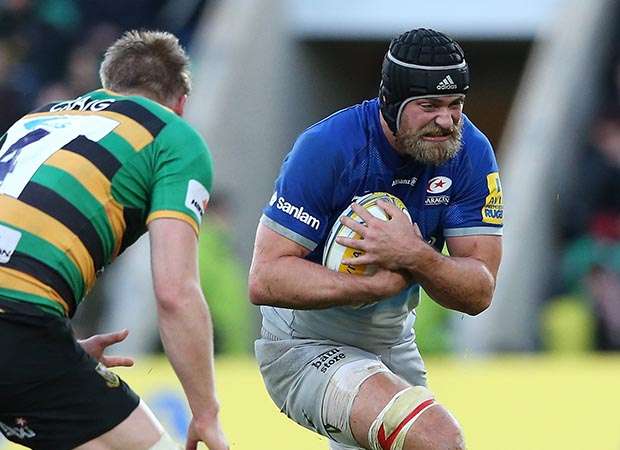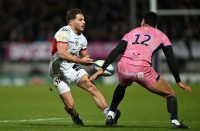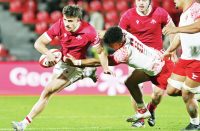 Gerry Gilpin and Ben Herring are poles apart – the former on the outer rim of Western Europe in Belfast, the other on the way to Antarctica in Dunedin. The Ulsterman appeared for Ireland in the early Sixties when the amateur ethos ruled and wounded players staggered on because substitutes hadn’t been invented. Four decades later, Herring the Kiwi played for the Highlanders, Hurricanes and Leicester.
Gerry Gilpin and Ben Herring are poles apart – the former on the outer rim of Western Europe in Belfast, the other on the way to Antarctica in Dunedin. The Ulsterman appeared for Ireland in the early Sixties when the amateur ethos ruled and wounded players staggered on because substitutes hadn’t been invented. Four decades later, Herring the Kiwi played for the Highlanders, Hurricanes and Leicester.
What they have in common is an experience of a condition which has grown into the biggest single medical issue in the sport, concussion. Their case histories are all the more relevant at the end of a week when Saracens’ South African lock Alistair Hargreaves became the latest victim.
Gilpin knows he played for Ireland in the winter and spring of 1962 only because the record book tells him so – at fly-half against England at Twickenham, at full-back against Scotland at Lansdowne Road and in the same position against France at Stade Colombes.
“I don’t remember anything of those matches,” he says. “I don’t remember any game of rugby I ever played and that goes right back to my days at school. I got concussed twice, in a schools‘ cup match and then during the French game in Paris.
“Michel Crauste gave me a forearm chop because I’d run past him and I went over backwards. There were no substitutes back then so if you could stand up you went out onto the wing but I couldn’t do that because I didn’t know where I was.
“All these recent instances of concussion got me wondering. When you are playing, your brain is focused on the game. When you are concussed, it hits that part of the brain and damages it. I wonder if that causes the memory loss.”
Gilpin has all his faculties, as illustrated by the fact that at 75 he still runs his own business management consultancy. When it comes to a black-out of his rugby career, he is far from on his own.
Ronnie Lamont, a schoolboy back row contemporary of Gilpin’s, played in all four Tests for the Lions against the All Blacks in 1966. “Ronnie had quite a lot of concussion and he can’t remember his games,” Gilpin says. “He told me recently about the terrible shoulder and ankle injuries he suffered during that Lions tour.
“Ronnie was a fearsome back row forward. The coach came in said to him, ‘how are you feeling, Ronnie?’ And he says, ‘absolutely terrible’.
“The coach says, ‘I’ve good news and bad new, the good news is that you are excused training on Monday, the bad news is that you’re playing next Saturday’.”
Two victims of concussion, former Canada captain Jamie Cudmore and Irish scrum-half Cillian Willis, are pursuing legal actions against their former employers, Clermont Auvergne and Sale Sharks respectively.
Herring was barely halfway through his second season at Leicester in January 2009 when he acted on medical advice to quit after three knock-outs in fairly rapid succession. It was, pardon the pun, a no-brainer.
“After the third one, it was an easy decision,” he says. “My mood changed for about six months after the last knock-out. I was grumpy and irritable. I suffered as well from a little dyslexia which scared me a bit.
“I’ve always liked writing but I found I couldn’t spell simple words for the life of me. You get a bit low and dark and it took me six months to come through to the other side.”
In the seven years since hanging up his boots at 29, Herring, left, has coached at Leicester and Nottingham, in Japan with the Green Rockets, in Canada with the national team and is now back home coaching Otago.
“There is a raised awareness about concussion now which is good,” he says. “Players are better educated on the subject. They are smart enough to say, ‘hang on, I’m not right, I’ve got to get this checked out’.
“In my day, we just kept playing. The attitude then was to try to shrug it off. There’s a different attitude now and I know quite a few young players who all think the same way, ‘if I get too many blows to the head, I’ll pull the pin because it isn’t worth the risk’.”
Meanwhile the count keeps rising, almost by the week and the players’ union, the RPA, keeps saying something has to be done. They were saying that after Herring had taken one blow too many almost eight years ago and they’re still saying it now.























